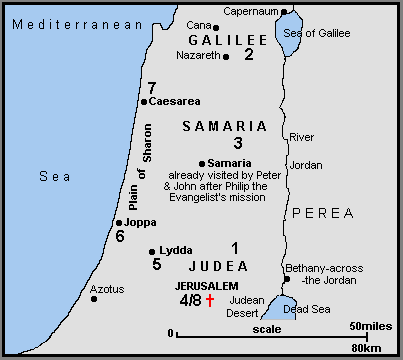Caesarea on Sea
One of my favorite pastimes, and more so these days with seemingly unlimited time for it if only I could stop watching old war movies and pouring over old car brochures, is studying scripture, especially prepping for group discussion such as Sunday School and the midweek Bible seminars I mentored for a dozen or so years after retiring from full-time parish ministry. And in reading the Bible one of the things I seem to notice is that the various authors wrote down almost nothing that is mere detail or to fill space: if I read slowly and look closely, just about everything is significant and/or informative in one way or other even if at first glance it might not seem so. Just a couple of examples from this morning's TGBC reading below.
One is Luke's description of Cornelius as a devout man who "feared God" with all his household. Seems to me this came up a few days ago when we met the Ethiopian eunuch, whom I conjectured was either a Jew or a "God-fearer," a person who, while not a Jew, might basically try to live somewhat jewishly, loving and worshiping the God of Israel but without circumcision or necessarily trying to keep all elements of the Law of Moses. And if the person was head of his/her household, the entire household might be led or required also to do as the master/mistress did. It is clear that Cornelius was such a man, a "God-fearer." It's not certain to me, but he may have been an active duty centurion, or perhaps retired military as I am, living in Caesarea by the sea as I live by the sea.
(interesting: https://www.biblestudytools.com/dictionary/caesarea/), which, IDK, may have been a popular place for retired military to settle.
So anyway, here's a man who already is a God-fearer, opening the Way of Christ to the gentiles and this, again interestingly, as the evangelistic work of Peter, a Jew to whom gentiles, like the animals he abhorred as food, would have been unclean. So in this little story, God himself opens the way for us. We'll see, perhaps tomorrow, I've not yet read Sunday's TGBC reading, what happens next.
The other thing I was noticing is that Simon Peter was staying at the home of Simon the Tanner, who lived by the sea. This came up in my blogpost a year or three ago: it isn't that Simon Tanner is so wealthy that he can afford a seaside home, it's that the stench of the tanning business, and its soaking into the very skin and being of the tanner, was so foul that he and his place of work had to be located where the ocean winds would carry the putrid smell away.
Joppa or Jaffa:

Acts 10:1-16
Peter and Cornelius
In Caesarea there was a man named Cornelius, a centurion of the Italian Regiment, as it was called. He was a devout man who feared God with all his household; he gave alms generously to the people and prayed constantly to God. One afternoon at about three o’clock he had a vision in which he clearly saw an angel of God coming in and saying to him, ‘Cornelius.’ He stared at him in terror and said, ‘What is it, Lord?’ He answered, ‘Your prayers and your alms have ascended as a memorial before God. Now send men to Joppa for a certain Simon who is called Peter; he is lodging with Simon, a tanner, whose house is by the seaside.’ When the angel who spoke to him had left, he called two of his slaves and a devout soldier from the ranks of those who served him, and after telling them everything, he sent them to Joppa.
About noon the next day, as they were on their journey and approaching the city, Peter went up on the roof to pray. He became hungry and wanted something to eat; and while it was being prepared, he fell into a trance. He saw the heaven opened and something like a large sheet coming down, being lowered to the ground by its four corners. In it were all kinds of four-footed creatures and reptiles and birds of the air. Then he heard a voice saying, ‘Get up, Peter; kill and eat.’ But Peter said, ‘By no means, Lord; for I have never eaten anything that is profane or unclean.’ The voice said to him again, a second time, ‘What God has made clean, you must not call profane.’ This happened three times, and the thing was suddenly taken up to heaven.
